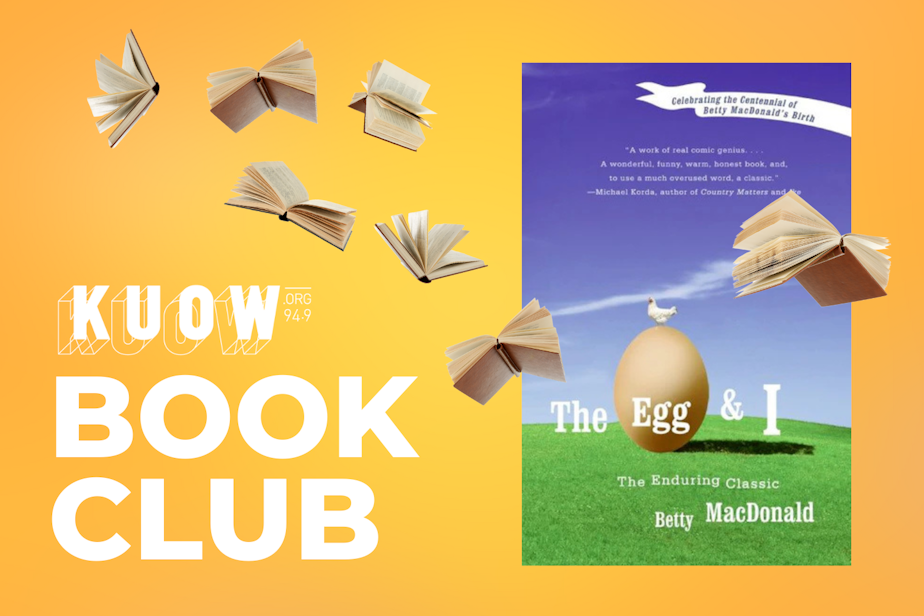Chickens are just the fall guy in this funny, blunt tale of life on the Olympic Peninsula

This is KUOW's book club, and we just read through the first half of Betty MacDonald Pacific Northwest classic "The Egg and I." I'm your club guide, Katie Campbell. Let's get into it.
O
h, Betty.
I find myself muttering that to myself a lot while reading "The Egg and I." Sometimes it's a sort of guffaw in response to a blunt observation she makes that has me just about slapping my knee with a laugh. Sometimes it's in exasperation at the old-fashioned (but not entirely forgotten) brand of racism that crops up a little too frequently. And sometimes it's in pity for this woman who clearly employed humor to mask the hurt she so often felt thanks to her husband.
RELATED: KUOW Book Club's December read: A comical memoir about life in 1920s Washington
We'll get to each of these "Oh, Betty" moments. But first, I have to address something rather odd: Betty MacDonald might be my distant relative!
Sponsored
Her given name, she says in the first chapter, was Anne Elizabeth Campbell, and she was born in Boulder, Colo., where my dad happened to have been born. Now, I know these are coincidences. There are a lot of Campbells in the world. We're certainly not all related, as evidenced by my lack of canned soup money — and my overreliance on jokes like that when I introduce myself. But this bit gave me pause:
Again, this is a common origin story for anyone with the name Campbell, but it fits pretty well with what I heard growing up. Suffice to say, I'm curious. And I'm going to try to deduce whether Betty and I are related at all before we finish reading. So, stay tuned!
RELATED: Subscribe to the KUOW Book Club newsletter here
With that out of the way, I also want to address the not infrequent racism directed at Native Americans. In the foreword to the book, written in the 1980s, Betty's own children tried to get ahead of this.
Sponsored
I don't intend to rehash this explanation — although I don't think being a "lady" is a valid excuse — but I think it's important to say that the issue is less with Betty's racist comments and more with the existence of this prejudice then and now. The stereotypes she applies to some of her Native neighbors on the Olympic Peninsula were not her own creation but were a perpetuation of racism that has resulted in land being stolen, cultures being attacked, families being displaced, and generations left to pick up the pieces. Even suggesting Betty simply misunderstood and mischaracterized the "plight" of Native people seems to suggest it is only their "plight" that should be understood at all. The book is not strictly about these issues, of course, but I've been disappointed and frustrated when Betty seemingly tries to turn the racism of the day into humor. She's funny enough without that nonsense.
I didn't just cringe at the casual racism, though. I also cringed as it became clear that some of her humor was a pretty mask over a truly rotten situation.
Consider this passage about life on the growing farm with her husband, Bob:
This comically desperate accounting of the mouths to feed would have been funnier if Betty did not express surprise, even confusion on the next page when Bob deigned to give her a kiss on the back of her neck.
Betty likes to point fingers at the chickens, blaming them for much of her misery. The problem seems to be to be less the farm and more Bob. It was his dream to have this operation, and Betty was raised to help her man be fulfilled.
Oh, Betty. Sure, you didn't care. Everyone who has ever said that definitely meant it. See, this is the other problem with raising people to be "ladies." They're led to believe this is the only way.
Betty was experiencing this marital angst at a time when she was expected to deal with it politely — and not expected to go and do something like become a best-selling author. She beat the odds in that regard and seems to have been an early feminist comic of sorts, even if she may not have seen herself that way. She reflects on the difficulty, loneliness, and frustration of her farm life with the kind of comedy that resonated in the 1940s and 50s, like "The Marvelous Mrs. Maisel" if Midge was first a chicken farmer.
Sponsored
I do wonder what kind of writer Betty might have been in the 2020s. There are moments of poetry, especially when she reflects on the Olympic Mountains, that hints at a desire to say more.
Betty may not have been perfect, but I doubt I've read a more reverent passage about the Olympics — and we read "The Good Rain" just a few months ago!
I hope to see my maybe-relative show more reverence for the peoples who admired that land long before she did and show less reverence for the whims of Bob. We will see.




